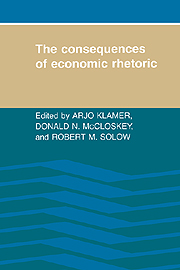Book contents
- Frontmatter
- Contents
- Preface
- The consequences of economic rhetoric
- PART I ECONOMIC RHETORIC: INTRODUCTION AND COMMENTS
- PART II ECONOMIC RHETORIC: FURTHER ARGUMENTS
- PART III ECONOMIC RHETORIC AMONG ECONOMISTS
- PART IV ECONOMIC RHETORIC IN POLITICS AND JOURNALISM
- PART V ECONOMIC RHETORIC: ITS RHETORIC AND ITS CONSEQUENCES
- 1 Appendix: Other contributors and participants
- Index
Preface
Published online by Cambridge University Press: 07 September 2010
- Frontmatter
- Contents
- Preface
- The consequences of economic rhetoric
- PART I ECONOMIC RHETORIC: INTRODUCTION AND COMMENTS
- PART II ECONOMIC RHETORIC: FURTHER ARGUMENTS
- PART III ECONOMIC RHETORIC AMONG ECONOMISTS
- PART IV ECONOMIC RHETORIC IN POLITICS AND JOURNALISM
- PART V ECONOMIC RHETORIC: ITS RHETORIC AND ITS CONSEQUENCES
- 1 Appendix: Other contributors and participants
- Index
Summary
In the early spring of 1986 about thirty economists, economic journalists, rhetoricians, philosophers, a political scientist, and a literary theorist gathered at Wellesley College for a conference on the Rhetoric of Economics. The composition of the group seemed unusual. Economists and humanists, after all, live in two different cultures and usually do not take each other's scholarly activities seriously. The conference could be an indication that times are changing.
The change is the emergence of a new “conversation” about economics that aspires to displace the dominant, positivistic view. The time is ripe, since positivism is losing its grip on the collective consciousness of economists and others as well. Its claim that “logic” and “facts” are the sole standards for the appraisal of economic theories does not appear to do justice to the complex reality in which economists operate. The new conversation attempts to alter our understanding of the reality by calling attention to the discursive aspects of economics, more particularly to its rhetorical forms.
The editors of the volume called the conference to explore the consequences of and to understand the resistance to this new point of view. We considered the participation of philosophers, rhetoricians, and literary theorists alongside economic practitioners to be critical. After all, now that we economists are becoming interested in our language and in our rhetorical devices, we would do well to pay attention to those scholars who have spent their professional lives thinking, writing, and talking about these subjects.
- Type
- Chapter
- Information
- The Consequences of Economic Rhetoric , pp. vii - xPublisher: Cambridge University PressPrint publication year: 1989
- 1
- Cited by

